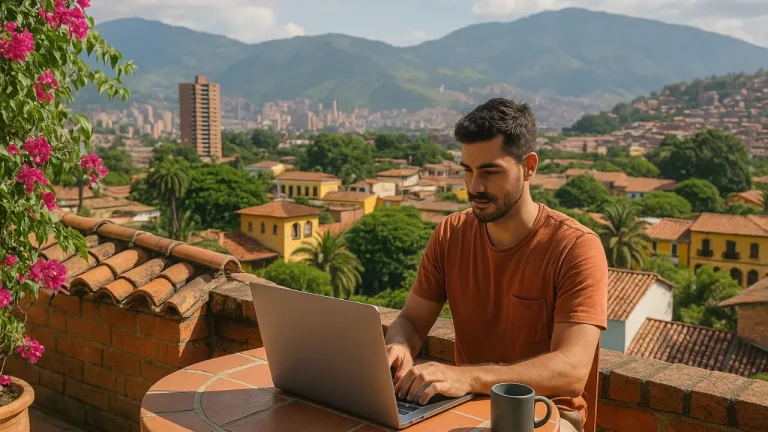Bali Remote Worker Visa: Everything You Need to Know in 2025
Planning to work remotely from Bali in 2025? Here’s exactly how to apply for the official Bali Remote Worker Visa (E33G) and stay legally while enjoying island life.

If you’re reading this, chances are you’ve daydreamed about trading office cubicles for coconut trees. You’re not alone. Thousands of remote workers have turned those dreams into reality by relocating to Bali, a place where your Zoom call backdrop could be a jungle villa or a rice terrace. But here’s the thing: working remotely from Bali without the proper visa isn’t just frowned upon, it can get you deported.
That’s why the Bali Remote Worker Visa (E33G) matters. Officially launched in 2024 and refined in 2025, it’s Bali’s way of saying, “Yes, you can work here, legally.”
What Is the Bali Remote Worker Visa (E33G)?
The E33G visa is essentially a Temporary Stay Permit, also known as KITAS, designed for remote workers employed by companies outside Indonesia. It lets you stay in Bali for up to one year, enter and leave as often as you like, and possibly enjoy tax exemptions on foreign income.
Some sources mention a five-year validity, but let’s not get ahead of ourselves. As of now, most reliable agencies and expat communities confirm a renewable one-year term.
A Real Story: Harriet and Harry’s Move to Bali
Harriet Sharpley-Fanner and Harry Todman left their UK retail jobs behind and moved to Bali to build a better life. They now live in a one-bedroom cottage in Canggu for around £225 a month and enjoy local meals for less than £3. Harriet works as a remote appointment setter, and Harry runs an online coaching business. The E33G visa gave them the legal freedom to thrive in paradise.
“We’ve saved money and gained peace of mind. The visa was surprisingly straightforward with the right agent,” Harriet shared in an interview with The Sun UK.
Who Is Eligible for the E33G Visa?
If you’re wondering whether this visa is right for you, start with these questions:
- Are you employed by a non-Indonesian company?
- Do you earn at least $60,000 annually?
- Is your passport valid for 18+ months?
- Can you show three months of bank statements proving income of $2,000/month?
Insider Tip: You can also apply if you’re a freelancer or entrepreneur, as long as your income comes from outside Indonesia.
The Application Process: A Step-by-Step Walkthrough
Let’s be honest, visa paperwork can be daunting. But Bali’s system has improved a lot, and working with a good agency makes the process manageable. Here’s what it typically looks like:
- Eligibility Check – Make sure your income and job type qualify.
- Document Collection – Passport, formal photo, employment contract, bank statements.
- Application Submission – Through Indonesia’s official e-Visa portal or via a trusted visa agent like Visa Services Bali MPG.
- Fee Payment – Around $920 depending on the agency.
- Approval Wait – Usually 2–4 weeks.
- Entry & Registration – Enter Indonesia, complete biometric registration at the immigration office, and receive your KITAS.
Don’t be the person who gets stuck at immigration because your bank statement was too blurry. Double-check everything.
Where to Work: Bali’s Top Coworking Spots
Bali’s digital infrastructure is no joke. Here’s where the Wi-Fi hums and creativity flows:
- Tropical Nomad (Canggu) – Open-air setup, social vibe, and stable Wi-Fi.
- Outpost Canggu – 24/7 access, fast fiber internet, and strong community events.
- Dojo Bali (Echo Beach) – A five-minute walk from surf breaks with kombucha on tap.
- Kinship Studio (Ubud) – For the artsy entrepreneur who likes a bit of peace with productivity.
According to The Wanderlover, these spaces often become the epicenter of collaboration and community.
Understanding Costs and Benefits
Cost of Living: You can live well on $1,200 to $2,500 per month, depending on your lifestyle. A smoothie bowl breakfast costs $4. Monthly villa rental? Around $500–$1,000 in Canggu or Ubud.
Visa Cost: ~$920 through an agent, including legal paperwork, KITAS, and guidance.
Benefits:
- Live legally for one year
- Bring your spouse and children under dependent KITAS
- Re-enter Indonesia as many times as you like
- Likely exempt from paying Indonesian tax on foreign income
Note: While most sources agree on tax exemptions, confirm with a local tax consultant to stay compliant.
Common Pitfalls and How to Avoid Them
Let’s save you the headache. Watch out for these mistakes:
- Applying last minute after arriving on a tourist visa
- Submitting unclear financial documents
- Assuming a five-year stay is guaranteed
- Forgetting to renew the visa on time
And no, working for Indonesian clients while on this visa isn’t allowed.
Final Thoughts: Is Bali the Move?
If you’re craving a healthier lifestyle, cultural richness, and the freedom to work where you feel most alive, Bali is calling. The E33G visa opens that door, legally and sustainably.
You don’t need to be a six-figure entrepreneur to make it happen. Just a remote job, a little planning, and maybe a love for nasi goreng.
Pack light, bring curiosity, and don’t forget your power adapter.
Bonus Resource: Join the Bali Expats or Canggu Nomad Girls Facebook groups to get real-time advice from fellow nomads.
FAQs
How long is the Bali Remote Worker Visa valid?
The standard duration is one year with unlimited re-entry. Some sources mention a five-year option, but this remains unverified.
Is income earned abroad tax-free?
Yes, most reports suggest that income earned from outside Indonesia is not taxed while residing in Bali. However, it is best to confirm with a tax advisor.
Can I apply from inside Indonesia?
Yes, you can apply while in Indonesia on a valid visa such as a C1 tourist visa. The process may involve obtaining a bridging visa.
Can I bring my family with the E33G visa?
Yes, spouses and children can stay in Bali with dependent KITAS permits. They are not allowed to work while on this visa.
What happens if I overstay or work illegally?
Overstaying or working without the correct visa may lead to daily fines, deportation, and a ban on reentry. Always apply for the appropriate visa before working remotely from Bali.






